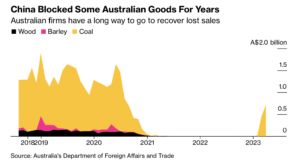As a result of the attack on Iran, nitrogen fertilizer at the port of New Orleans has seen an increase in price this week. Urea prices for barges in New…
China Trade Issues in Focus
Financial Times writers Joe Leahy and James Politi reported last week that, “China’s commerce minister and his US counterpart have raised concerns about their countries’ trade and investment policies at a meeting in Washington but pledged to keep channels of communication open in the first visit by a senior Chinese official to the US capital since 2020.
“The talks between Chinese commerce minister Wang Wentao and US commerce secretary Gina Raimondo on Thursday came with Washington and Beijing showing tentative signs of efforts to stabilise relations, which have hit their lowest point in 50 years.”
Glad to welcome Minister Wang Wentao to D.C. Minister Wang and @SecRaimondo exchanged views on trade issues in a candid, professional and constructive manner.
— Xie Feng 谢锋 (@AmbXieFeng) May 26, 2023
China-US economic and trade ties are mutually beneficial in nature. Such win-win cooperation should continue. pic.twitter.com/KqHWQP40Hg
Also last week, Financial Times writer Edward White reported that, “Joe Biden’s top trade official and China’s commerce minister have held talks over economic and trade disputes, in the latest signs of tentative efforts to stabilise ties between the two superpowers.

“US Trade Representative Katherine Tai met Chinese commerce minister Wang Wentao on the sidelines of an Asia-Pacific Economic Cooperation meeting in Detroit on Friday. She raised concerns about Beijing’s actions against US companies as well as its ‘non-market’ approach to the economy and trade policy, according to a statement from her office.
The FT article stated that,
Still, with US-China relations at their lowest point in decades, efforts to improve diplomatic activities are struggling to make progress, with the two sides clashing over new restrictions on access to technology as well as Xi’s backing of Vladimir Putin’s invasion of Ukraine.
On Saturday, Bloomberg writers Sam Kim and Eric Martin reported that, “Commerce Secretary Gina Raimondo said the US ‘won’t tolerate’ the recent decision by Chinese authorities to ban chips by Micron Technology Inc. in some critical sectors, using her sharpest language yet to describe Washington’s reaction.”
The Bloomberg article noted that, “Raimondo’s comments Saturday come after the two sides had a chance this week to air their grievances in person and pledged to keep communications open going forward. Raimondo met with her counterpart, Wang Wentao, in Washington on Thursday, followed by a similar meeting Friday with United States Trade Representative Katherine Tai.
“Those meetings are part of a broader intention by the President Joe Biden’s administration to restore high-level discussions with Beijing, including potential visits to China by Treasury Secretary Janet Yellen and further direct talks between Biden and President Xi Jinping.”
Meanwhile, Bloomberg writer Agnieszka de Sousa reported late last week that, “China is hungry for commodities, and Russia has a lot of them. As the two nations increase their trade, agricultural goods are high on the priority list.

“At a bilateral business forum in Shanghai on Tuesday, Russian Prime Minister Mikhail Mishustin said his country’s farmers were ready to significantly increase agricultural exports to China, news agency Interfax reported.”
Lily Kuo and Lyric Li reported in Saturday’s Washington Post that, “Expanding Russia-China economic ties would represent a shift in a relationship that has chiefly been about political alignment against the West.”
Elsewhere, Bloomberg writers Eric Martin and Swati Pandey reported on Saturday that, “Australia’s barley sector may be the next beneficiary of the thawing relationship with Beijing, Trade Minister Don Farrell said following another meeting with his Chinese counterpart.

“Farrell, speaking in Detroit after his third meeting with Chinese Commerce Minister Wang Wentao in the past two months, said he expects China will remove its 80% tariffs on Australian barley exports within the next few weeks. Australia recently suspended its World Trade Organization case to give Beijing an opportunity to review the matter.”
More broadly regarding the Chinese economy, Financial Times writers Joe Leahy, Xinning Liu, Thomas Hale and Chan Ho-him reported on Sunday that, “Five years ago, China’s economy was growing fast enough that many graduates were able to snap up good jobs. Now, their prospects are less certain, as the country’s economic recovery is failing to pick up pace six months after authorities began to roll back President Xi Jinping’s tough zero-Covid regime.
“Industrial production and profits, property sales and credit growth have all fallen short of analysts’ projections in April and early May, recent data showed, sapping confidence in the growth prospects for the world’s second-largest economy.”
And on Monday, Reuters writers Ningwei Qin and Dominique Patton reported that, “Heavy rain has flooded wheat fields in China’s central Henan province, just days ahead of the harvest, pushing up prices and raising concerns about the quality of this year’s crop in the world’s top consumer of the grain.
“The rain, which started in the middle of last week in the southern half of Henan, is causing some of the wheat to sprout or become affected by blight, according to videos posted on social media and a local grain dealer.”
The Reuters article indicated that, “China is expected to harvest a bumper crop this year, with officials estimating a crop at least as large as last year’s.
“The good outlook and a surge in imports in recent months has pressured prices in recent weeks to a one-year low, attracting demand from animal feed makers who are swapping corn for cheaper wheat.”
Also, in Tuesday’s Wall Street Journal, Nancy A. Youssef reported that, “China has rebuffed a U.S. request for a meeting between their defense chiefs on the sidelines of an annual security forum in Singapore this weekend, the Pentagon said Monday, showing the limits of a tentative rapprochement between the two rival powers.”





